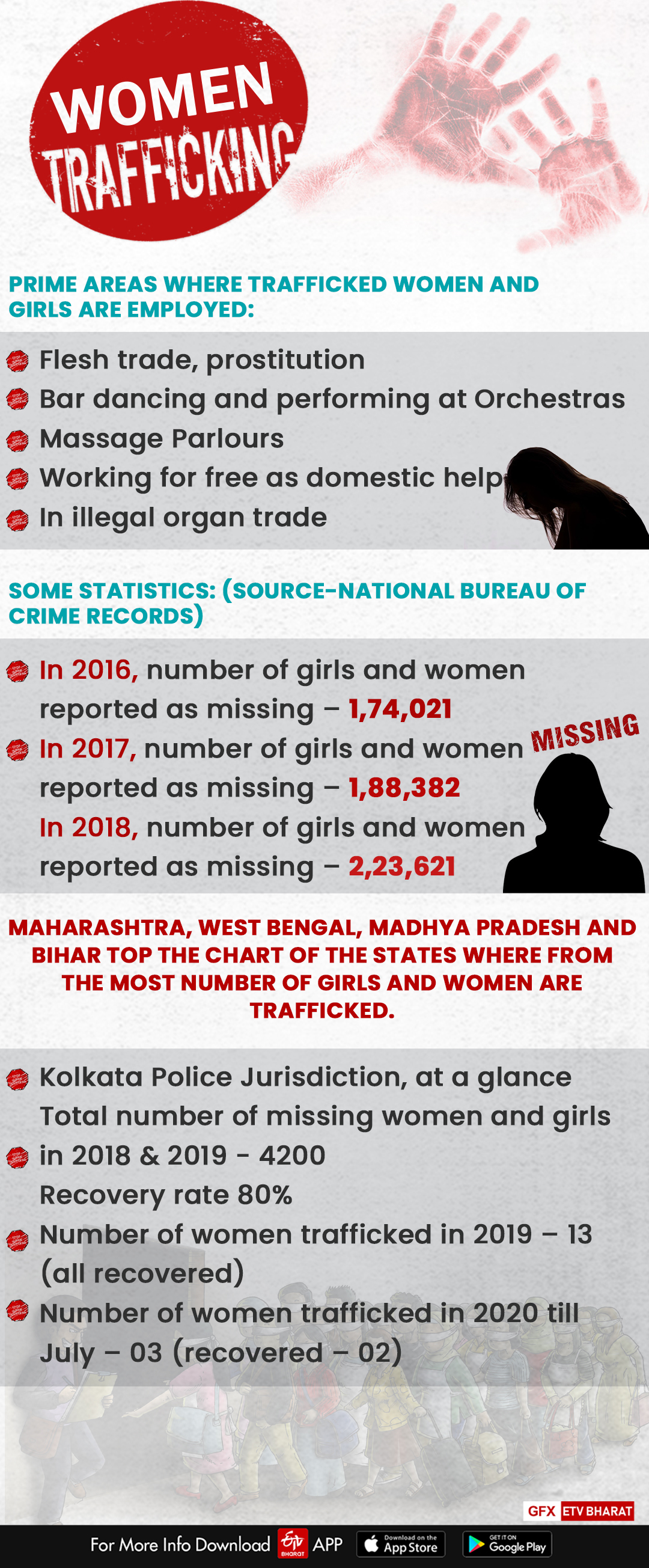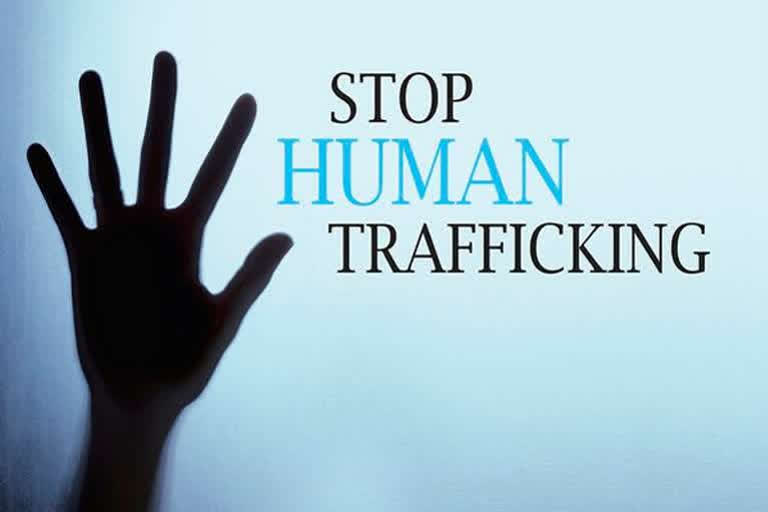Kolkata/ Bhubaneswar/Guwahati: The Covid-19 pandemic and the resulting lockdown has brought in several problems in normal life. However, it has also had a positive effect on one of the evil trades continuing unabated in the states of West Bengal, Odisha, and Assam - the trafficking of women.
Travel restrictions, lockdown, and suspension of normal train services across the country had put a temporary lid on the illegal trade, which has affected the lives of many young hapless girls. However, as we enter the phase of Unlock-3 and more restrictions are eased off, the threat is all set to return to the hinterlands of the three states. The eastern region of the country has a notorious reputation as the hub of women trafficking, and with the gradual easing of lockdown protocols, it is once again inching towards the dubious distinction.
From massage parlours to dancing at bars, from brothels to private parties and escort services, the women, many of whom are girls, are exploited by pimps and middlemen, who lurk in the villages and countryside scouring for their 'catch'.
The Hyderabad police recently arrested an individual Shivakumar from the Dilsukhnagar area for his involvement in a human trafficking racket. The police also rescued two women from the area, both natives of West Bengal. A probe revealed that the gang was run by a person named Chinna and the gang members were engaged in trafficking girls from West Bengal and Maharashtra. Chinna is yet to be arrested.

Barasat Unnayan Prastuti, an NGO which has been closely working with the West Bengal Child Line, said that the pandemic and lockdown has brought in more prowling on young girls via the online route.
Read: The evil of human trafficking
"Most girl victims are trafficked for flesh trade, nearly 90 per cent of them. The rest are engaged in other services like massage parlours and escort services. The recent trend is scouring for potential victims via online and social networking sites. With people remaining mostly indoors, access and use of online services have grown manifold and the middlemen are keeping a close watch for victims," said Ranjit Dutta, secretary of the NGO.
Chairperson of West Bengal Women's Commission Leena Gangopadhyay told ETV Bharat that the loss of jobs during the pandemic has jeopardised many rural households, leading to rise in vulnerability.
"The women traffickers are targeting those households in rural Bengal, where the pandemic and lockdown have played havoc. And the situation has been compounded by the devastation caused by Cyclone Amphan in five south Bengal districts. The displaced and distressed women in the villages are turning out to be easy prey. We are alert and keeping a tab on the situation," said Leena.
Siliguri in north Bengal acts as a chicken's neck to push girls and women from the North East as well as the state to other parts of the country as well as to neighbouring Nepal.
Local Child Line incharge Sonu Sharma said though women trafficking has decreased significantly during the lockdown, it would make a comeback once things ease down. "But, it will scale up once railway operations start in full swing. We work closely with the Sashastra Suraksha Bal personnel along the Indo-Nepal and Indo-Bhutan borders and the BSF along the Indo-Bangladesh border to keep a tab on all women making their way in and out of India," he said.
Read: Hike in child trafficking cases during lockdown with no reports in police stations
One of the prominent NGOs working in north Bengal is Kanchenjunga Rescue Centre. Prabhat Pathak of the Centre revealed that traditionally, the New Jalpaiguri railway station, Bagdogra airport and transit routes through Kishanganj in neighbouring Bihar have been the favoured routes of the traffickers.
"Of late we have noted that women traffickers have been taking the girls to Assam and then to Mizoram, from where they are flown to Delhi and other parts of the country. This option is taken to bypass the strict vigil on the traditional routes. We have informed the police about this, but the unlock situation will bring in some spike in the numbers of trafficked women. We have to be extra vigilant," said Pathak.
Both Dr Rajeeb Sarma, general secretary of the Global Organisation for Life Development and Debo Prasad Sarma, assistant programme manager of Save the Children in Assam, echoed similar views.
"It is not only the lockdown, but also the devastating floods, which has affected 27 districts of Assam and has marooned close to 54 lakh people. It will only add to the woes of the rural population in the state. And with it, will come the spurt in trafficking of women," said Debo Prasad.
The Assam Committee for Protection of Child Rights (ACPCR) has alerted all district officials to ensure that women traffickers should not take advantage of the present situation due to Covid-19 pandemic and floods.
Read: Amid COVID-19, human traffickers on the prowl targeting women and girl children
During the past five months, more than 20 children have been rescued by NGOs and government agencies from Bhubaneshwar alone. The police and state Child Line volunteers have been constantly monitoring the situation and they say with easing of lockdown norms, the situation has turned grim. NGOs have pointed out that after every major calamity, the state witnesses a spike in child and women trafficking cases.
"The same situation was witnessed in 1999 after the Super Cyclone, which had virtually devastated the coastal belt of the state. More than 10,000 girls were trafficked from the region in the aftermath of the devastation and mostly lured in false promises of marriage. This pandemic situation is no less and we have to remain extremely cautious with more phases of Unlock kicking in," said a member of the state Child Welfare Committee.
The lockdown and travel restrictions had its effect on slowing the rate of women and girl trafficking from the East. With Unlock 3, and more easing of restrictions, things could eventually turn sour.
Some harrowing tales of trafficking
Uttara (name changed) was married young. By the time she was in her early 30s, Uttara, a resident of Baduria in North 24 Parganas, West Bengal, was settled in her worldly chores, taking care of her family. Social networking sites on her mobile phone had always been a close companion and it was during one of her browsing sessions that she got to know a young man, Sirajul. Both chatted frequently, got to know each other and soon after the lockdown eased, Uttara met Sirajul in Barasat and decided to leave home. Police intervention did not help as the woman said she was willingly leaving with Sirajul for Uttar Pradesh. Recently, a local NGO trying to trace Uttara in UP, could not do so. A bit of digging revealed that she had been sold off to conduit in Mumbai.
Read: Over 74 lakh unaccounted cash seized in Assam, 3 held in suspected drug trafficking
In a similar case, a college student of Bongaon along the Indo-Bangla border met a young man over a missed call friendship service. Over the period, both of them decided to start a new life. The girl left home for Gujarat, but landed at several brothels before eventually ending up in Mumbai. She was later rescued by the police.
In yet another harrowing case, a 15-year-old girl was rescued from a brick kiln in West Bengal's Swarupnagar close to Basirhat. She was lured out of her home on promises of marriage and a good life. A member of a local NGO first got the information and later on informed the Child Line (helpline). In a joint operation by the police and Child Line volunteers, the girl was rescued from a locked up room inside a brick kiln. Initial probe revealed that the girl was supposed to be taken to Pune first and later on, to Mumbai for flesh trade. The plan got jeopardised due to restrictions on normal train running.



